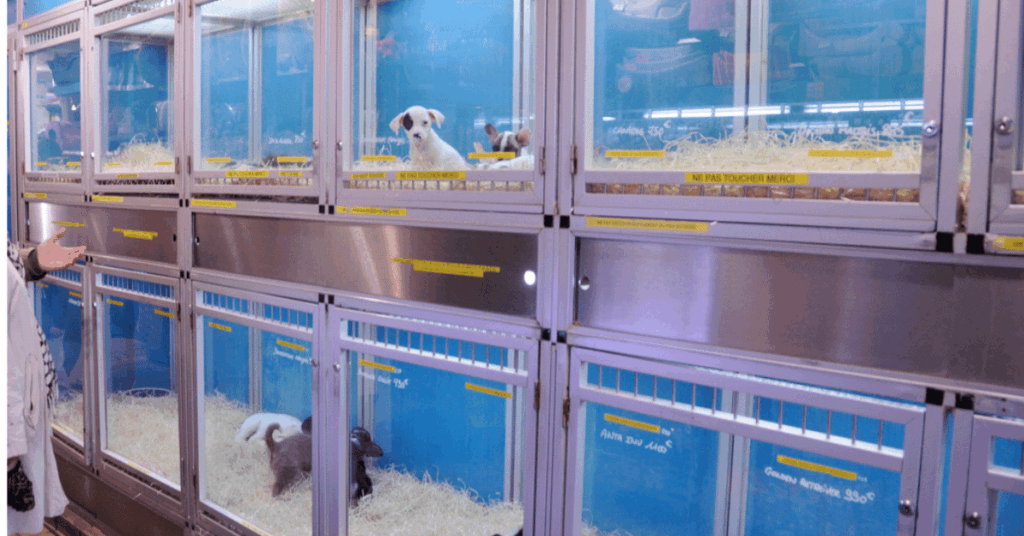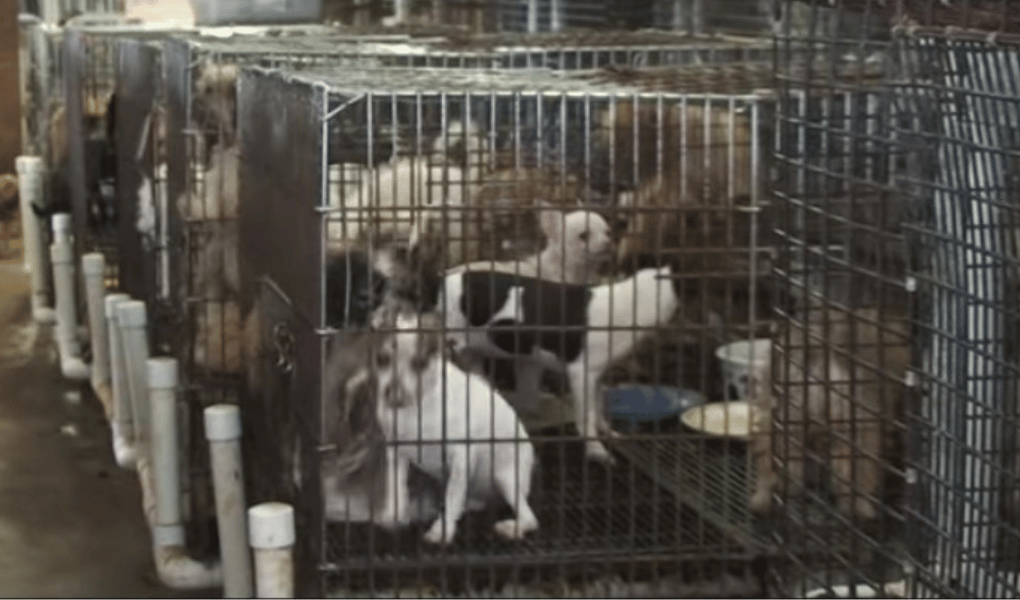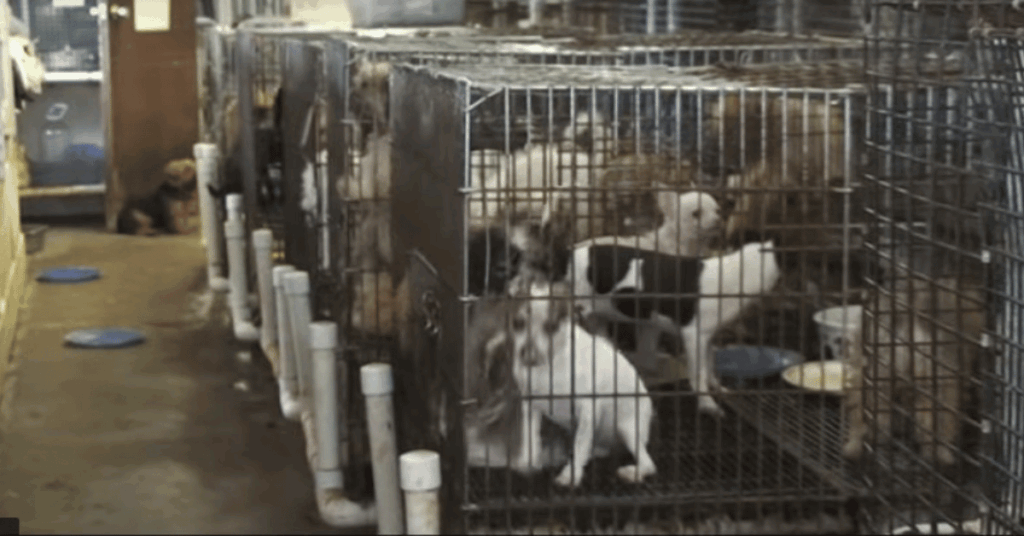NOTICE
The second week of May is Puppy Mill Action Week in the United States
The above photo and those like it are difficult to look at, aren’t they? We’ve all seen them, the news stories that another puppy mill has finally shut down. Or the heart-wrenching commercials of sad animals needing donations. Most of us are appalled when we see them on television. They show the horrible and inhumane conditions that those puppies and their parents live in. But those news stories don’t show even half of what these poor dogs go through every single day.
I hate seeing and hearing about the sad and disturbing treatment of dogs and cats (any animal). So, for that reason, at ChiChis And Me I don’t generally subject my readers to it. Isn’t there enough sadness in the world?
But the second week of May is Puppy Mill Action Week. So I do want to bring awareness to the plight of these poor dogs. The only way I can do that effectively is to show just how bad it is and how much these little dogs suffer.
Believe it or not, there are still people who don’t really know what puppy mills are and what they subject their dogs to. So, I warn you now that this post may be too disturbing for some. However, the good news is that there are simple things that each one of us can do to help.
You may even think you know what a puppy mill is. However, this post will break down what they are, how they operate, and why they are still operating all over the country.
what is a puppy mill?
Puppy mills are high-volume dog breeding facilities that churn out puppies simply for profit. The people who run puppy mills are greedy and are simply interested only in the money. They care nothing for any of the dogs in their care, only that they survive long enough to be sold for profit. They sell puppies online, through classified ads, in flea markets, and in pet stores. Many puppy mills also sell their dogs to drug and product testing companies. The majority of puppies sold online are from puppy mills. All pet stores get their puppies from puppy mills — no matter what they tell you. No responsible breeder would sell a puppy to a pet store.
some alarming statistics
As of 2024, it’s estimated that over 10,000 puppy mills are operating in the United States. These facilities are large-scale commercial dog breeding operations that prioritize profit over the welfare of the animals. Of these, fewer than 3,000 are regulated by the U.S. Department of Agriculture (USDA), leaving the majority unlicensed and unmonitored.
These puppy mills collectively house approximately 500,000 dogs kept solely for breeding purposes. Annually, they produce and sell around 2.6 million puppies, many of which are distributed through pet stores, online platforms, and other commercial outlets.
Missouri continues to lead the nation in the number of puppy mills, a trend that has persisted for over a decade. The state’s high concentration of these facilities has earned it the designation of the “Puppy Mill Capital of the U.S.”
Sources: Wikipedia;Humane World For Animals
are there still pet stores that still primarily sell puppies?
Approximately 3,500 to 3,700 pet stores in the United States sell puppies and kittens. That is according to estimates from the Pet Industry Joint Advisory Council (PIJAC). This represents roughly 30% of the nation’s 11,500 to 12,000 pet stores.
Notably, Petland is currently the only national pet store chain that continues to sell puppies. Other major retailers, such as PetSmart, Petco, and Pet Supplies Plus, have ceased the sale of puppies and instead focus on pet adoptions through partnerships with shelters and rescue organizations.
the largest pet store still operating
The biggest pet store still operating all over the United States is Petland. Maybe you have one in your area. When you walk into Petland it looks clean, people are friendly, and the puppies look happy and well-cared for. If you ask them where they get their puppies, they will tell you they get them from USDA-inspected breeders. You can learn more about “USDA inspected” breeders HERE.
Petland gets all its puppies from puppy mills, mostly in the Midwest part of the United States. Oh, they will tell you otherwise, but it is a fact. They count on soft-hearted people who either won’t look into where they actually get their puppies or will turn a blind eye to that fact because they “fell in love” with one of their puppies.
When at the pet store, they are usually fed well to fatten them up, but are kept several in a cage all day and all night. The sick ones are kept out of sight, and no money is spent on veterinary care. Some may survive, but most that arrive sick eventually die before they can be sold.
warning: the following video may be disturbing to some viewers
This is where pet stores (including Petland) get their puppies. While the moms and dads are kept in these conditions until they can no longer breed, then they are euthanized. Don’t be fooled!
puppy mill abuses: how they operate
Puppy mill kennels can be anything from small wooden cages of wood and wire mesh to tractor-trailer cabs to simple tethers attached to trees. Female dogs are bred twice a year and are either killed or abandoned when they can no longer produce puppies. Mothers and their puppies suffer from malnutrition, exposure, and little or no veterinary care.
Puppies are torn away from their mothers (often at too young an age) and sold to brokers. Then the brokers pack them into crates for transport and resale to pet stores. Puppies who are shipped from mill to broker to pet store can travel hundreds of miles in pickup trucks, tractor-trailers, and airplanes, often without adequate food, water, ventilation, or shelter.
what happens to those that survive?
The poor puppies who actually survive this insane treatment have had no actual human love or care and often make unsuitable pets from lack of human contact. Because of this they may have behavior issues or expensive health issues later in life and are often then surrendered to shelters because they weren’t the sweet little loving puppies they were expecting. Or surrendered to shelters because they simply can not afford the veterinary costs of treating health issues that stem from this horrific treatment.
Puppy mills make a whopping profit from pet stores. It is almost impossible to shut down puppy mills as long as pet stores keep them in business. Yes, they sell a lot of puppies online and in other ways as mentioned above, however, without the income from pet stores their profit would be greatly reduced and most would not survive without the pet store income. Many puppy mills strictly sell to pet stores.

what happens to the puppies that are not sold?
Even though pet stores sell their puppies at hugely inflated prices, they sell a lot of puppies. But what happens to the ones that don’t sell? Pet stores will often cut their losses and give (or sell at reduced prices) to employees, friends, or rescue groups.
Discounting or Promotions: First, the price is usually lowered. Some stores might bundle the puppy with supplies or offer financing options to encourage adoption.
Transfer to Other Locations: Chains with multiple branches (like Petland) might move the puppy to a different store where there’s more foot traffic or demand.
Return to Breeder: In some cases, the store has an agreement with the breeder to take the puppy back if it doesn’t sell after a certain time.
Adoption or Donation: Some stores will partner with rescue organizations or shelters to place the puppy in a home through adoption.
Staff Adoptions: Occasionally, employees or people connected to the store may adopt the puppies.
what is a backyard breeder?
A backyard breeder is an individual who breeds animals, typically dogs or cats, on a small scale without the proper knowledge, experience, or concern for responsible breeding practices. Unlike professional breeders who follow ethical guidelines and prioritize the health, temperament, and genetic integrity of their animals, backyard breeders often breed pets purely for profit or personal reasons. They may not screen for hereditary health conditions, provide necessary veterinary care, or socialize the animals adequately, which can result in pets with medical or behavioral issues.
Backyard breeders usually operate out of their homes or yards and may sell animals through online ads, social media, or word of mouth. Because their practices lack regulation and oversight, the well-being of the animals is often compromised. Puppies and kittens from backyard breeders may be separated from their mothers too early, raised in poor conditions, or not receive vaccinations and deworming. Supporting backyard breeders can unintentionally contribute to pet overpopulation and suffering, which is why many animal welfare advocates urge people to adopt from shelters or buy only from responsible, reputable breeders.
conclusion
The harrowing realities faced by dogs in puppy mills—marked by confinement, neglect, and a lack of socialization—underscore a systemic issue that demands our attention. These animals endure unimaginable hardships, all for the sake of profit, leaving them physically and emotionally scarred.
As compassionate individuals, we have the power to challenge and change this narrative. By choosing adoption over purchasing from pet stores or online sellers, we take a stand against the inhumane practices of puppy mills. Supporting legislation aimed at regulating or banning these operations further amplifies our commitment to animal welfare.
Every decision we make, from where we acquire our pets to how we advocate for them, contributes to a larger movement toward ethical treatment of animals. Let us be the voice for those who cannot speak, ensuring that no dog suffers in silence within the confines of a puppy mill.
want to know more?

10 simple things you and i can do to shut down puppy mills
So, when you see these news stories about puppy mills, do you think that you wish there were something you could do to help? I think we all do, but then life goes on, and you forget. Well, actually, there are ways that you and I as individuals can help stop these monsters that run puppy mills.
